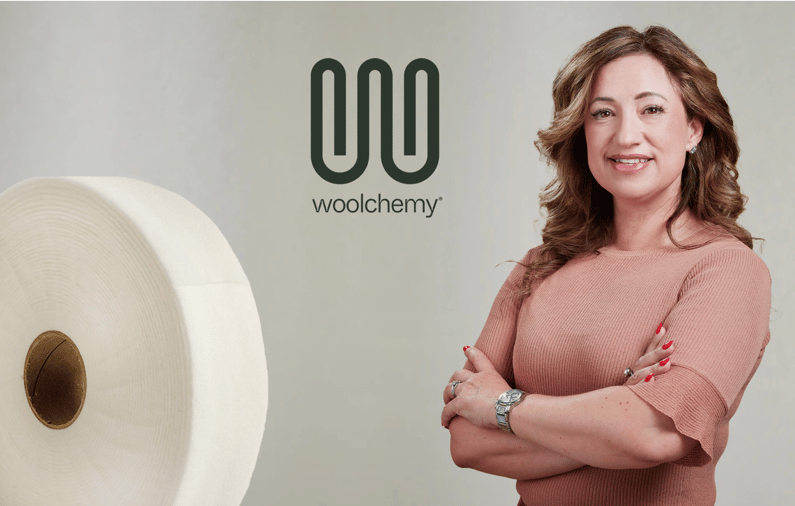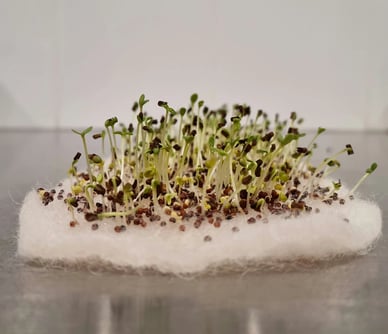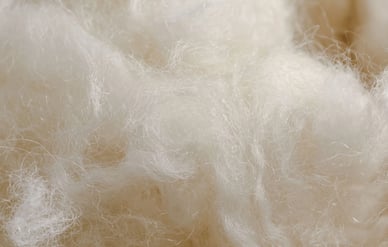How Wellington startup Woolchemy is making sustainable and versatile wool-based materials. Woolchemy is a company Booster is thrilled to support. We're not just neighbours in Wellington; Woolchemy embodies the kind of company Booster wants to invest in and see grow.

Let's start with its name - a mashup of ‘wool’ and ‘alchemy’. That's no accident. Woolchemy, led by Derelee Potroz-Smith, a former engineer turned CEO, does magic with wool using a patented, organic chemistry process. This makes it much better at managing moisture. This is a big deal as wool is not just sustainable, it's also biodegradable.
This could lead it to replacing oil-derived synthetics in certain product ranges across things like nappies, sanitary pads and even hydroponic growing surfaces.
Derelee puts it best: “At Woolchemy, our mission is clear: to harness the power of science and nature to transform wool into innovative, sustainable materials that enrich lives and protect our planet.”

|

|
The Booster Innovation Fund supports Kiwi ingenuity like Woolchemy's. It has been on a journey, doing deep research and now is about to hit a major milestone. With support from Booster, Woolchemy is gearing up to launch their woolly materials into the market, as Derelee revealed at an investor roadshow:
“In the coming year, consumer products utilising our materials will be available to buy, which we expect will fuel increased production to meet rising demand.”
Woolchemy is teaming up with some global heavyweights to make sure it can produce the new products in large quantities while being eco-conscious. It has tested its neweflex material in a South American nappy factory, with a production line cranking out 500 disposable nappies per minute. Woolchemy's new wool stood up to this rigorous industrial process in an important landmark.
It was these kinds of disposable nappies that first led Derelee to think about waste, after raising three children and seeing how much she had to throw out.
In 2020 alone, around 300,000 nappies were thrown away each minute. The 167 billion nappies made every year take 248 million barrels of oil to produce.
“It was shocking the amount of waste that these little beans can create, used nappies, in particular.” Derelee said. “Disposable nappies are the third biggest single [consumer item] contributor to landfill.”

But here's where Woolchemy steps in with their sustainable neweflex material. Woolchemy promises that its super thin material sucks moisture away from babies’ skin and is biodegradable. Plus, the Wellington-based startup says that its material is better at regulating heat, keeping babies cozy at night and cool during the day, helping them sleep. Derelee also boasts of its natural odor busting abilities, overcoming the need to use chemicals to suppress foul smells.
Woolchemy also makes newezorb, a washable fabric, again made from wool. newezorb, Woolchemy says, boosts wool’s water capturing ability to ten times its weight – a property it retains for over 100 washes.
Both are coming to the market at an opportune moment. People, governments and shareholders everywhere are clamouring for solutions to tackle waste and climate change. Sanitary products are on the European Union’s list of the ten most-common single use plastic products found on European beaches and have been directly targeted by the 2019 Directive on Single-Use Plastics. Vanuatu banned single-use nappies.
“Woolchemy has developed materials that answer all of these demands,” Derelee said.
The focus now is on scaling up production after years of research.
Initially, Woolchemy's fabrics might pop up in premium products, but as it cranks up the volume, prices should drop.
New Zealand is one of the world’s wool superpowers, with around 27 million sheep. Most of the wool it produces is the thicker kind used in furniture and carpets. Woolchemy takes and transforms this strong wool, which could give struggling farmers a much-needed boost. Wool is often tossed aside because it costs more to shear than what it's worth. Woolchemy's process has the potential to make this wool more valuable and does it in a way that's gentle on the environment. Derelee, part of a family that has been raising sheep in New Zealand for more than seven generations, knows what this could mean:
“We are looking to establish wool contracts with wool growers, which will support the wool industry.”
As the world keeps pushing to use fewer fossil fuels and fewer plastics, Woolchemy's products could become even more needed. With governments thinking about taxing or banning certain single-use plastics and with fluctuating oil prices, Woolchemy's natural products are coming to market and could be a boon for sustainability-minded consumers, legislators and investors.
Woolchemy isn't stopping there. It’s diving into more research, like combining the moisture-repelling and absorbing powers of neweflex and newezorb into composite materials. It is even checking out other fibres like hemp to see where that might lead.
Innovation, imagination and invention are needed to tackle the climate crisis. All are typified by Woolchemy. And that attitude could have added benefits. As Derelee said:
“Doing good is good for business. This is a principle I stand by and one that I know Booster Innovation Fund also embodies.”
Share this article
We're here to help
Based in Wellington, we’re here to help you make confident money choices that grow your finances. Whether you’re saving for a first home, investing in your future or planning for retirement and more, Booster is here to help.
Call us on 0800 336 336Send us a message
Get a financial adviser
-
Read more about Booster’s Booster Innovation Fund.
The Booster Innovation Fund (fund) is part of the Booster Innovation Scheme 2 which is issued and managed by Booster Investment Management Ltd (Booster). The fund’s Product Disclosure Statement is available at www.booster.co.nz
